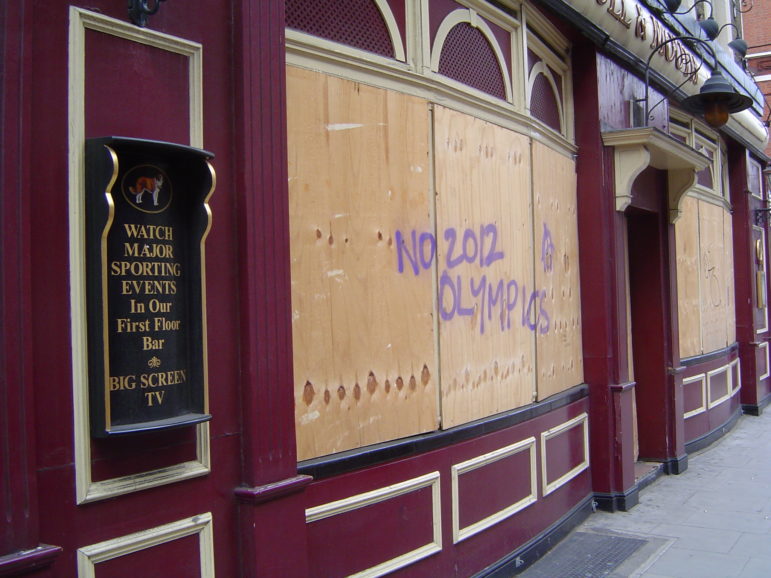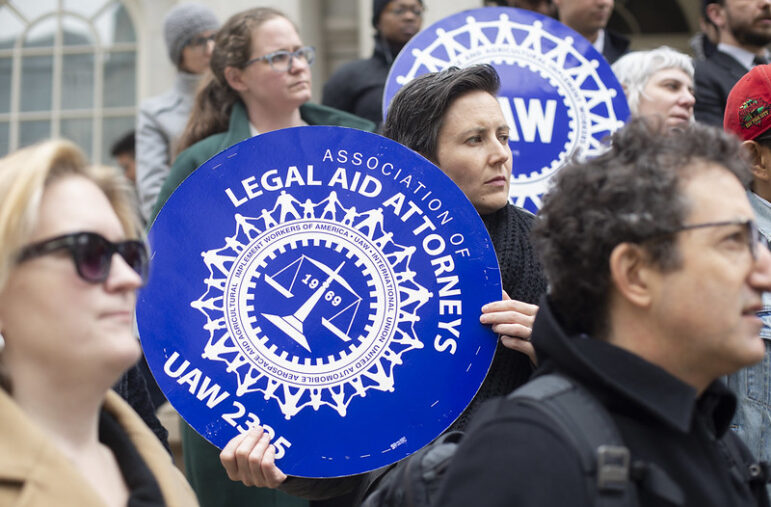
Goldon Joly
Most but not all New Yorkers wanted the Games. Support for London's bid was not unanimous, either, as the graffiti on this pub indicated.
As my own faction of Team USA on Tuesday spent its fifth night huddled around the TV set cheering on the likes of Katie Ledecky, Gabby Douglas and that guy who wins all the swimming medals, I hearkened back to the heady days of 2005, when New York City was among the five finalists for the 2012 games.
This video from NYC 2012, the organization that promoted the bid in concert with the Bloomberg administration, outlined what the games would have looked like here:
Pitted against London, Madrid, Moscow and Paris, New York beat out the Russians in the first round of voting but placed last and was eliminated on the next pass. Given the Olympics’ sad litany of foolish public investment and social exclusion, and amid growing worries at the time about what rapid redevelopment was already doing to New York’s neighborhoods and low-income people, some of us breathed a sigh of relief. After all, the NYC 2012 bid was closely linked to the hair-brained scheme to build a Jets stadium on the West Side; that idea died before the IOC’s voting, but the very notion of such a massive giveaway of public assets only hardened fears that New York’s Olympic planning was not going to stick the landing.
At the same time, for those of us who grasp that New York City is the center of the world, it was exciting to think about the games finally coming here. London, which ended up winning the 2012 bid, has hosted the games three times; New York, which is a way better city, has never. Hosting the games would have proved that the city was still capable of taking on Really Big Things, a vain and chauvinistic but nonetheless powerful consideration in a city where a simple bike lane can trigger Herculean struggles these days.
And for all the corporate money-making and nationalistic teleplaying than the Olympics represent, the events themselves are, let’s face it, awesome. To be a subway ride or two away from beach volleyball, synchronized diving and the high jump would have been super cool — and not just because it would have made sporting a Speedo socially acceptable for a couple weeks.
Back in 2005, surveys reflected these mixed emotions. Most New Yorkers supported the city’s Olympic bid, according to polling by Quinnipiac University. But a majority opposed the West Side stadium, even though most New Yorkers understood that the stadium was critical to the city’s bid. The message seemed to be that we wanted the games, but we didn’t want the things we needed to build to get the games.
Whatever the sentiments 11 years ago, the city has clearly moved on. Talk about a bid for the 2024 games broke out in 2014 but when Mayor de Blasio opted not to support such a push there was nary a grumble. Meanwhile, many observers have suggested that, for better or worse, New York ended up getting a lot of the development envisioned by—and perhaps facilitated by—the Olympic bid. New York University scholar Mitchell Moss wrote in a 2011 report:
Although New York City ultimately lost its Olympic bid, comprehensive plans were approved for the targeted areas. In each, a major rezoning was completed, which included planned affordable housing, mass transit enhancements, new parks and amenities, and other new infrastructure. In addition, four of the facilities that were to be part of the Olympic Plan have either been completed or are under construction.
Whether those rezonings and other moves have been or will be to the city’s benefit is an open argument. At least some reports from London indicate that Olympic infrastructure is for the most part enjoying a productive second life, but hopes that the massively costly games would have a broader, socially transformative effect on the UK have been unfulfilled.
Positive or negative, the post-mortems on Britain’s 2012 experience can’t analyze the key counterfactual—Could the billions expended on that infrastructure have been spent more productively?—because one can’t assume that, absent the shiny international event, they would have been spent at all.
It’s just as speculative to talk about New York’s alternate history, of what would have occurred if the 30th Olympiad had come to town. We can evaluate the value of the rezonings and the new subway stops, but the impact of the games would have been more than infrastructural. There would have been the event itself, a moment in the city’s history that might have been shared broadly … or been reserved for the more affluent, with the rest of the city looking in. The Olympic games offer many things, but cheap seats aren’t among them: A single ticket for tonight’s 90-kg judo finals in Rio runs about $222.








